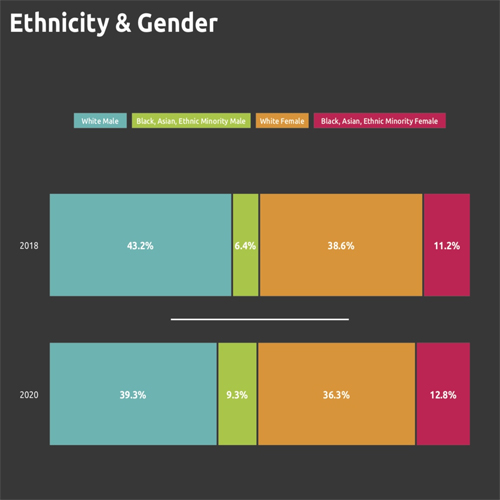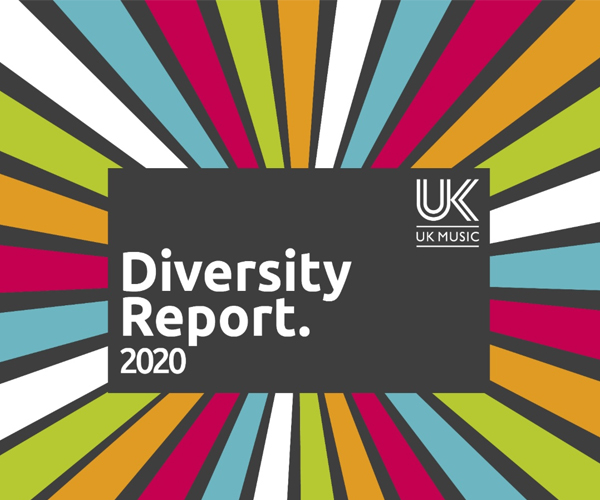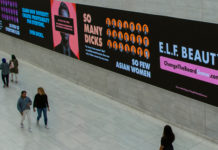UK Music has today unveiled the findings of its 2020 Workforce Diversity Survey, as well as a “game-changing plan” to boost diversity and inclusion (D&I) in the music business.
The survey findings reveal that the music industry is continuing to make good progress on improving D&I over the past four years. There have been improvements at entry level for both women and Black, Asian and ethnic minority representation, reveals the survey.
Representation of Black, Asian and other ethnic minorities between those aged 16-24 in the music industry stands at a record high of 30.6% – up from 25.9% back in 2018. The proportion of women has also increased from 45.3% in 2016 to 49.6% in 2020. The number of people from Black, Asian and other ethnic minority communities at entry-level has also risen from 23.2% in 2018 to a new high of 34.6% in 2020.
MORE DIVERSITY A MUST
However, the number of women in the 45-64 age group has dropped from 38.7% in 2018, to 35% in 2020. And, although the Representation of Black, Asian and other ethnic minorities at senior executive levels has risen slightly from 17.9% in 2018 to 19.9% this year, they still represent just one in five senior posts.

In short, the results show that more needs to be done to improve representation and retention of both women and Black, Asian and minority ethnic communities at senior levels. More also needs to be done for those in the older age groups working in the music business.
Commenting on survey the results, UK Music Chief Executive Jamie Njoku-Goodwin stated: “If our music industry is to tell the story of modern-day Britain, then it needs to look like modern-day Britain too. This ground-breaking report is an important step towards achieving that. This report consists of a frank and candid analysis of the current situation our industry faces, and a bold and ambitious Ten-Point Plan for how to achieve the positive change we all want to see. It’s relevant not just to the music industry, but to organisations everywhere. “
DIVERSITY & INCLUSION GOALS
As an industry, “we are united in our determination to lead the way on improving diversity and inclusion in our sector and across society”, Njoku-Goodwin confirmed. Adding to his comments, UK Music Head of Diversity Rachel Bolland said: “We have listened to diverse communities and worked with the Diversity Taskforce to change our language and approach to the Diversity Report, and have produced our most comprehensive report to date. We are committed to listening and adapting moving forward.”
The survey findings from UK Music – the collective voice of the UK music industry – come in the wake of a year of action, triggered by the death of George Floyd and the protests in support of Black Lives Matter. They follow a concerted campaign in the music industry to reset itself to better support the Black community with events such as #BlackoutTuesday. The results will also inform industry initiatives to build on the work that followed the #MeToo campaign to highlight sexual abuse and harassment.

BOOSTING DIVERSITY
The survey findings have also helped to inform the work carried out this year by UK Music’s Diversity Taskforce’s Chair Ammo Talwar MBE and Deputy Chair Paulette Long OBE. Both have worked collaboratively with music industry leaders and UK Music members to draw up a “new ground-breaking” Ten-Point Plan to boost D&I in the industry.
“Against a backdrop of global change the Diversity Taskforce has been carefully listening, challenging and working behind the scenes to help shape a transformational and game-changing Ten-Point Plan,” stated Talwar. “This plan is data driven, evidence based with metrics and lived experience. It’s the accumulation of nine months’ work across the whole music industry to support yet hold the industry to account. No tokenistic statements, no short-term wins but a truly collaborative long term plan that reboots the sector and ensures diversity is front and centre of all major decisions.”
TEN-POINT PLAN
The main objectives of the Ten-Point Plan include:
• Urban classification to be replaced in all reports and communications – either by genre such as Soul or Rap; UK Music members will commit to support those who wish to use the term “Black music”. Members to stop using the acronym BAME – and instead use Black, Asian or ethnic minority background rather than the ‘offensive and outdated’ acronym, as reported.
• Compile a database of persons accountable and responsible for diversity across organisation.
• Commit and spend an allocated amount of their annual recruitment budget to ensure a diverse candidate pool.
• Members to allocate a certain amount of their annual training budget on a 12-month diversity Continuing Professional Development/training programme to ensure fair career opportunities for all.
• Allocate budget and implement a programme to increase diverse representation in middle and senior management.
• Help UK Music implement better transparency around Gender and Ethnic pay gap – move towards lower reporting rate of 50+ employees.
• Each UK Music member to identify a socially engaged organisation whose work relates to gender or race whom they can invest in on a long term basis.
• Every UK Music member to develop diversity policies and internally set diversity targets for core staff. Targets to be published and reported to UK Music and updated annually in order to assess progress. Member bodies to promote D&I to partners and stakeholders ensuring industry standards are met.
• UK Music members to amplify their work with UK Music Diversity Taskforce to increase the response rate and ultimately the data collected in the Biennial UK Music Workforce. Diversity Survey with both their own employees and membership. Aim to have 80% of core staff respond to next survey.
• Each UK Music members to work towards increasing diversity on its executive bodies and boards – 30% diverse (race) and 50% (gender). Progress towards these goals is to be reported to UK Music as part of the annual progress audit.
ACHIEVING LASTING CHANGE
Commenting on the plan, Long stated: “The last four and a half years has seen our Diversity Taskforce lead the way with a survey giving evidence of issues that needed highlighting, and introducing a Ten-Point Plan to address and rectify some of the underlying obstacles. It’s good to see industry organisations review and reset imbalances on their boards. But I am still wary of ‘knee jerk’ reactions and want to task industry gatekeepers to look towards making long lasting systemic changes. Let us resolve to never turn back.”

Image credit: Davis Sanchez, Pexels
The survey collates data from across the music business including studios, management agencies, music publishers, major and independent record labels, music licensing companies and the live music sector. This year, a record 3,670 people working in the music industry took part in UK Music’s survey.
The results are published every two years and provide the music industry, Government and other stakeholders an insight into where D&I improvements are needed. The annual D&I survey was established in 2015 to boost D&I across the industry, and is overseen by UK Music’s Diversity Taskforce. Since its launch, the survey tracks progress to boost D&I in the UK’s music business – an industry that contributes £5.2 billion a year to the UK economy and sustains 190,000 jobs.
Click here to read the full report.








































